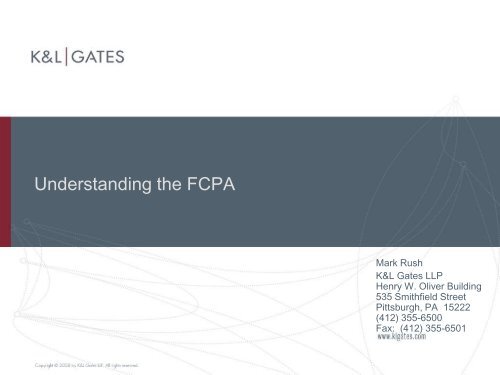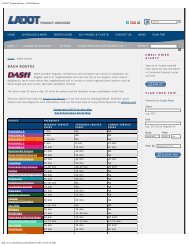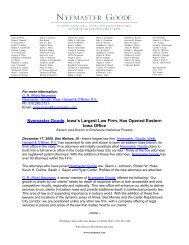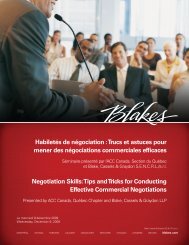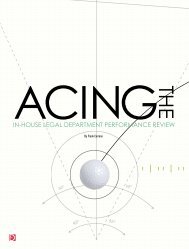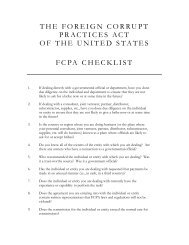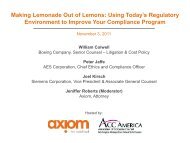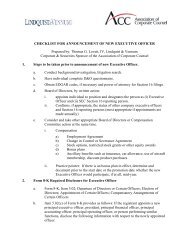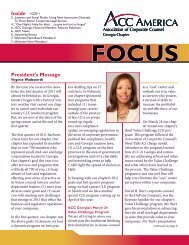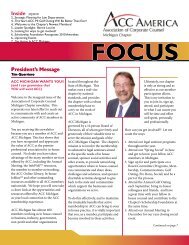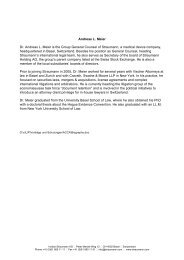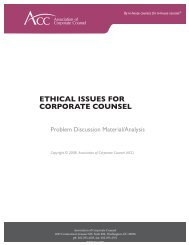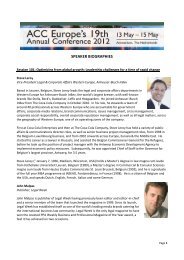Understanding the FCPA - ACC.com
Understanding the FCPA - ACC.com
Understanding the FCPA - ACC.com
Create successful ePaper yourself
Turn your PDF publications into a flip-book with our unique Google optimized e-Paper software.
<strong>Understanding</strong> <strong>the</strong> <strong>FCPA</strong><br />
Mark Rush<br />
K&L Gates LLP<br />
Henry W. Oliver Building<br />
535 Smithfield Street<br />
Pittsburgh, PA 15222<br />
(412) 355-6500<br />
Fax: (412) 355-6501
Introduction: A Robust Enforcement Climate<br />
U.S. Foreign Corrupt Practices Act (―<strong>FCPA</strong>‖) enacted in 1977<br />
Three-fold increase in enforcement activity at DOJ since<br />
2004<br />
Increased numbers of <strong>FCPA</strong>-dedicated attorneys in Fraud<br />
Section<br />
Approx. 50 FBI agents working on <strong>FCPA</strong> matters<br />
2007 a landmark year<br />
Largest number of DOJ & SEC enforcement actions (38)<br />
Largest <strong>com</strong>bined settlement to date ($44 million) – likely to<br />
soon be eclipsed<br />
Largest criminal penalty to date ($26 million)<br />
Approx. 100 <strong>com</strong>panies believed to be under investigation at<br />
year end<br />
1
Introduction: A Robust Enforcement Climate (cont.)<br />
―Just <strong>the</strong> tip of <strong>the</strong> iceberg,‖ says Mark F.<br />
Mendelsohn, DOJ Deputy Chief of Fraud Section.<br />
―A full-court press on <strong>FCPA</strong> investigations,‖<br />
promised by Frederic D. Firestone, SEC Associate<br />
Director of Enforcement Division.<br />
2
Introduction: A Robust Enforcement Climate (cont.)<br />
Not just in U.S. – international enforcement on <strong>the</strong> rise<br />
Parallel Enforcement Proceedings:<br />
U.K.: Serious Fraud Office (―SFO‖)/Serious Organized Crime<br />
Agency (―SOCA‖)<br />
China: Central Commission for Discipline Inspection (―CCDI‖)<br />
identified corruption as <strong>the</strong> biggest threat to <strong>the</strong> Communist<br />
Party<br />
Germany: tele<strong>com</strong>munications giant pays $284 million in fines<br />
to end investigation plus $253 million in back taxes due to<br />
improper deductions taken from illegal payments<br />
Inter-agency & international cooperation<br />
SFO, DOJ, and Swiss authorities investigate defense contractor<br />
DOJ and French magistrate investigate international construction<br />
contractor<br />
3
<strong>Understanding</strong> <strong>the</strong> <strong>FCPA</strong><br />
4
<strong>FCPA</strong> Overview<br />
Two Distinct But Complementary Sets of Provisions:<br />
Anti-Bribery: Prohibiting bribery of foreign public<br />
officials<br />
Books & Records: Requiring internal controls and<br />
imposing accounting standards for publicly-traded<br />
<strong>com</strong>panies<br />
5
<strong>FCPA</strong> Anti-Bribery Provisions<br />
The <strong>FCPA</strong> Foreign Payments Provisions<br />
Commonly referred to as <strong>the</strong> ―Anti-Bribery Provisions‖<br />
Apply to:<br />
U.S. and foreign <strong>com</strong>panies with registered securities or<br />
who file with SEC<br />
Their directors, officers, employees and agents<br />
U.S. citizens, residents, and entities organized under U.S.<br />
law or with principal business location in U.S.<br />
Foreign nationals and entities who <strong>com</strong>mit a violation while<br />
in <strong>the</strong> U.S.<br />
Enforced by <strong>the</strong> Department of Justice, Criminal Fraud<br />
Section<br />
6
<strong>FCPA</strong> Anti-Bribery Provisions – Elements<br />
The <strong>FCPA</strong>’s anti-bribery provisions prohibit –<br />
any “knowing” act in support of<br />
a payment, an offer to pay or an authorization<br />
to pay<br />
money or ―anything of value‖<br />
directly or indirectly (e.g., through any agent, consultant, or<br />
third-party)<br />
to any foreign government official, foreign political party or<br />
party official, foreign political candidate, or officers of a public<br />
international organization (―foreign officials‖); or<br />
to a third person “knowing” it will be passed on to a<br />
foreign official<br />
7
<strong>FCPA</strong> Anti-Bribery Provisions – Elements (cont.)<br />
―Corruptly‖<br />
An intent to wrongfully influence <strong>the</strong> recipient<br />
Does not require that <strong>the</strong> act be fully<br />
consummated or succeed in producing <strong>the</strong> desired<br />
out<strong>com</strong>e<br />
In order to obtain or retain business or to direct<br />
business to any person, or<br />
O<strong>the</strong>rwise secure ―any improper advantage.‖<br />
8
<strong>FCPA</strong> Anti-Bribery Provisions - Definitions<br />
“Knowing”<br />
Having actual knowledge<br />
Having reason to know<br />
Acting with deliberate indifference<br />
Acting with reckless disregard<br />
UPSHOT: You cannot deliberately insulate<br />
yourself or be willfully blind and you must know<br />
your foreign business partners.<br />
UPSHOT: For all practical purposes, a duty has<br />
been imposed.<br />
9
<strong>FCPA</strong> Anti-Bribery Provisions – Definitions (cont.)<br />
Knowledge – <strong>FCPA</strong> “Red Flags”<br />
A history of corruption in <strong>the</strong> country<br />
Any family relationships between participants and government officials<br />
Unusual payment patterns or financial arrangements<br />
Unusually high <strong>com</strong>missions<br />
Lack of transparency in expenses and accounting records<br />
Refusal by a foreign joint venture partner or agent to provide a<br />
representation that it will abide by <strong>the</strong> <strong>FCPA</strong><br />
Re<strong>com</strong>mendation of <strong>the</strong> joint venture partner or agent by a government<br />
official<br />
Apparent lack of qualifications on <strong>the</strong> part of <strong>the</strong> agent to perform services<br />
Any misrepresentations in connection with a proposed transaction<br />
10
<strong>FCPA</strong> Anti-Bribery Provisions – Definitions (cont.)<br />
“Payment” or “anything of value,” including –<br />
Stock or o<strong>the</strong>r interest in or profits from a business<br />
Improvements in real property<br />
Personal property<br />
Personal favors<br />
In-kind services<br />
Entertainment<br />
Discounts on products or services not readily available to<br />
<strong>the</strong> public<br />
Assumption or forgiveness of debt<br />
NOTE: THERE IS NO MATERIALITY STANDARD<br />
11
<strong>FCPA</strong> Anti-Bribery Provisions – Definitions (cont.)<br />
“Foreign government official”<br />
Any officer, employee, or person acting in an official capacity on<br />
behalf of<br />
a foreign government<br />
any department, agency, or instrumentality of <strong>the</strong> foreign government<br />
a public international organization (e.g., <strong>the</strong> U.N.)<br />
a foreign political party<br />
Examples<br />
members of royal families who maintain ownership or managerial<br />
interests in government industries or government-controlled<br />
<strong>com</strong>panies.<br />
any entity hired to review and accept bids for a government agency<br />
officers and employees of public utilities<br />
officers and employees of government owned businesses<br />
managers and employees of government instrumentalities (e.g.,<br />
hospitals, schools, etc.)<br />
12
<strong>FCPA</strong> Anti-Bribery Provisions – Definitions (cont.)<br />
“Obtaining, Retaining or Directing Business”<br />
Obtaining or retaining contracts<br />
Securing necessary government approvals, such<br />
as licenses or permits, that involve <strong>the</strong> exercise of<br />
government discretion<br />
Obtaining favorable tax or customs rulings<br />
UPSHOT: Any payment intended to influence a<br />
government decision that might favorably affect<br />
business will likely be considered a violation, subject<br />
to investigation, fines, and jail terms.<br />
13
<strong>FCPA</strong> Anti-Bribery Provisions<br />
Exceptions & Defenses: The <strong>FCPA</strong> does not prohibit –<br />
―Grease‖ or ―facilitating‖ payments, e.g.<br />
To obtain permits, licenses or o<strong>the</strong>r official documents in order to qualify<br />
to do business in a foreign country<br />
To process governmental papers such as visas and work orders<br />
To secure police protection, mail pick-up and delivery or scheduling of<br />
inspections related to contract performance or transit of goods<br />
To obtain telephone service, power and water supply, loading and<br />
unloading cargo, or protection of perishable products or <strong>com</strong>modities<br />
Clerical duties that do not involve <strong>the</strong> exercise of discretion<br />
Reasonable, bona fide expenditures associated with <strong>the</strong> promotion,<br />
demonstration, or explanation of a product or performance of a<br />
contract, e.g., travel and entertainment<br />
Payments expressly permitted under <strong>the</strong> written laws of <strong>the</strong> foreign<br />
country<br />
14
Summary of <strong>FCPA</strong> Anti-Bribery Provisions<br />
Making a bribe or promising to give anything of<br />
value in an attempt to influence <strong>the</strong> action or<br />
inaction of a foreign official is strictly prohibited<br />
This includes payments to consultants, agents, or<br />
any o<strong>the</strong>r intermediary or representative when <strong>the</strong><br />
party making <strong>the</strong> payment knows or has reason to<br />
believe that some part of <strong>the</strong> payment will be used<br />
to bribe or influence a foreign official<br />
Severe penalties may be imposed for violations of<br />
<strong>the</strong> <strong>FCPA</strong>, both against individuals and <strong>com</strong>panies<br />
15
<strong>FCPA</strong> Books & Records Provisions<br />
Two Sets of Requirements:<br />
Accuracy of books and records<br />
Internal accounting controls<br />
Apply to publicly traded <strong>com</strong>panies and <strong>the</strong>ir employees and agents<br />
Enforced by <strong>the</strong> SEC<br />
16
<strong>FCPA</strong> Books & Records Provisions<br />
Accuracy of Books & Records<br />
Books and records must be kept in “reasonable detail” so that <strong>the</strong>y<br />
“accurately reflect” <strong>the</strong> <strong>com</strong>pany’s transactions and <strong>the</strong> use of its assets<br />
Any off-book transaction with respect to foreign governments or <strong>the</strong>ir<br />
agents is a violation<br />
In<strong>com</strong>plete or inaccurate recording of transactions is sufficient to<br />
support a books and records violation, even if no corrupt transaction is<br />
proven<br />
The SEC is currently enforcing books and records violations that do not even<br />
involve sales to foreign governments<br />
WHY? Because such inaccuracies could be <strong>the</strong> result of attempts<br />
by employees and agents to disguise bribe payments and create<br />
“slush funds” for such payments.<br />
17
<strong>FCPA</strong> Books & Records Provisions<br />
Internal Accounting Controls<br />
Requires <strong>the</strong> <strong>com</strong>pany to maintain a system of internal<br />
accounting controls adequate to ensure that –<br />
Assets are used as authorized by <strong>com</strong>pany management (i.e.,<br />
access to assets is generally restricted)<br />
Expenditures and assets are recorded in accordance with<br />
generally accepted accounting principles<br />
Assets are examined periodically – conduct routine audits<br />
Accounts are kept in a way that will reveal any discrepancies so<br />
that appropriate remedial measures may be undertaken<br />
18
<strong>FCPA</strong> Books & Records Provisions<br />
Application to Subsidiaries<br />
Wholly-owned and majority-owned subsidiaries<br />
must <strong>com</strong>ply<br />
Issuers must make good faith efforts to have<br />
subsidiaries owned fifty percent or less <strong>com</strong>ply<br />
Actual control renders parent responsible for<br />
<strong>com</strong>pliance of subsidiary<br />
19
Summary of <strong>FCPA</strong> Books & Records Provisions<br />
The <strong>FCPA</strong> requires that –<br />
1. The true nature and amount of all payments should be<br />
recorded, regardless of <strong>the</strong> nature or size of <strong>the</strong> payment<br />
(e.g., a $20 facilitating payment must be recorded as<br />
such)<br />
2. All original documents relating to <strong>the</strong> transaction should<br />
be maintained (such as invoices, receipts, or expense<br />
reports)<br />
3. All books and records entries should accurately reflect<br />
<strong>the</strong> amount, date, purpose, and identity of <strong>the</strong> recipient of<br />
<strong>the</strong> payment<br />
20
<strong>FCPA</strong> Penalties Are Severe<br />
21
<strong>FCPA</strong> Criminal Penalties<br />
Up to $2 million per violation for issuers and domestic<br />
concerns<br />
Up to $250,000 fine and/or 5 years in prison for<br />
individuals<br />
Disgorgement of profits resulting from illegal conduct<br />
Willful books and records violations—<br />
Up to $25 million for issuers and domestic concerns<br />
Up to $5 million and/or 20 years in prison for individuals<br />
Alternative fines of equal to twice <strong>the</strong> amount of <strong>the</strong> total<br />
gain or loss<br />
Corporation cannot indemnify individuals<br />
22
<strong>FCPA</strong> Civil Penalties<br />
Injunctions against future violations of <strong>the</strong> <strong>FCPA</strong><br />
Civil monetary penalties – $10,000 per violation<br />
Forfeiture<br />
Disgorgement of profits resulting from illegal conduct<br />
―Collateral consequences‖ such as debarment – e.g., from<br />
doing business with U.S. government<br />
Denial of export licenses<br />
Tax consequences, e.g., disallowance of deductions and<br />
treating payments by subsidiaries as taxable in<strong>com</strong>e to<br />
U.S. parent <strong>com</strong>pany<br />
23
<strong>FCPA</strong> Compliance<br />
24
<strong>FCPA</strong> Compliance<br />
Three Elements:<br />
Robust corporate <strong>com</strong>pliance program<br />
Due diligence for particular transactions and<br />
relationships<br />
Prompt response to violations, or indications<br />
of a violation<br />
The government will consider each of <strong>the</strong>se<br />
elements in evaluating whe<strong>the</strong>r or not to bring an<br />
enforcement action<br />
25
<strong>FCPA</strong> Compliance<br />
Compliance Program Essentials<br />
A clearly defined corporate policy, including conduct codes and<br />
internal procedures<br />
Dissemination of policy to all employees<br />
Periodic training and emphasis on <strong>the</strong> requirements<br />
of <strong>the</strong> policy and associated controls and procedures<br />
Periodic certifications of <strong>com</strong>pliance from personnel<br />
Management<br />
Finance<br />
Sales<br />
Due diligence concerning intermediaries and business partners<br />
Robust anticorruption provisions in contracts<br />
Audit testing of all business locations with particular emphasis on<br />
high-risk areas and new acquisitions<br />
26
<strong>FCPA</strong> Compliance<br />
What Should Due Diligence Include?<br />
Know <strong>the</strong> <strong>com</strong>pliance climate of <strong>the</strong> foreign country by<br />
consulting:<br />
State Department<br />
Commerce Department<br />
Relevant U.S. Embassy (<strong>com</strong>mercial desk)<br />
Transparency International<br />
Private sources including:<br />
Law firms<br />
Banking institutions<br />
Private investigators<br />
Auditing firms<br />
27
<strong>FCPA</strong> Compliance<br />
What Should Due Diligence Include?<br />
Know your business partners –<br />
Evaluate <strong>the</strong> <strong>com</strong>petence and expertise of joint venture<br />
partners, agents and intermediaries<br />
Inquire about <strong>the</strong> relationships <strong>the</strong>y may have with<br />
government officials<br />
Examine or audit books of business partners<br />
28
<strong>FCPA</strong> Compliance<br />
What Should Due Diligence Include?<br />
Joint Venture Partners, agents, and o<strong>the</strong>r intermediaries—<br />
Private parties to a joint venture can create <strong>FCPA</strong> headaches if<br />
<strong>the</strong>re is indirect ownership or control by foreign officials or by a<br />
foreign government<br />
The DOJ tends to assume a flow-through of benefits in such<br />
circumstances<br />
Conduct due diligence in advance<br />
Obtain representation to abide by <strong>FCPA</strong><br />
Include walk-away provision for suspected <strong>FCPA</strong> violations<br />
Particularly important for minority owners in JV context<br />
29
<strong>FCPA</strong> Compliance<br />
What Should Due Diligence Include?<br />
Know <strong>the</strong> market and proceed with caution –<br />
Examine <strong>the</strong> reasonableness of proposed <strong>com</strong>pensation –<br />
i.e., is it reasonable in relation to <strong>the</strong> services provided?<br />
Carefully scrutinize ―success fees‖ or o<strong>the</strong>r payments<br />
Obtain legal opinions concerning <strong>com</strong>pliance with local law<br />
Apply a <strong>com</strong>mon sense ―smell test‖<br />
Maintain records of all due diligence and <strong>com</strong>pliance activities<br />
conducted<br />
30
<strong>FCPA</strong> Enforcement Trends<br />
31
Emerging Enforcement Trends<br />
Six aspects of recent enforcement action show <strong>the</strong> expanding and<br />
developing nature of <strong>FCPA</strong> enforcement activities –<br />
•First, government emphasis on <strong>the</strong> importance of implementing robust<br />
and effective <strong>FCPA</strong> <strong>com</strong>pliance program<br />
•Second, significant number of <strong>FCPA</strong> matters arise in two key<br />
contexts:<br />
• Payments made to and actions taken by third-party sales advisers<br />
• Liabilities obtained through, or discovered while performing due<br />
diligence for, corporate acquisitions<br />
32
Emerging Enforcement Trends (cont.)<br />
• Third, widening scope of industries under DOJ/SEC/FBI scrutiny for<br />
<strong>FCPA</strong> violations<br />
• Fourth, investigating world-wide activities of single <strong>com</strong>panies, not<br />
just isolated incidents involving a specific country, official, subsidiary,<br />
or employee<br />
• Fifth, recent enforcement actions even when no illegal bribe has<br />
been paid –<br />
• Books and records violations<br />
• Lack of internal controls<br />
• Sixth, penalties for violations of <strong>the</strong> <strong>FCPA</strong> continue to increase<br />
• 2007 saw <strong>the</strong> largest <strong>com</strong>bined penalty and disgorgement ever paid under <strong>the</strong><br />
<strong>FCPA</strong>, a total of $44 million<br />
• Public disclosures by <strong>com</strong>panies regarding ongoing investigations make it<br />
probably that that amount will soon be eclipsed.<br />
33
2008 <strong>FCPA</strong> Enforcement Activity<br />
• Wabtec Corp.<br />
• Non Prosecution Agreement (―NPA‖)<br />
• Settlement with DOJ evidences a dim and narrow view of <strong>the</strong><br />
facilitating payments exception<br />
• $30 - $60<br />
• Compliance monitor/Disgorgement plus prejudgment interest<br />
• Flowserve Corp.<br />
• Deferred Prosecution Agreement (―DPA‖)<br />
• Books & Records and Internal Controls violations for conduct of<br />
French and Dutch subsidiaries<br />
• Disgorgement plus prejudgment interest<br />
• DOJ settlement for French subsidiary conduct only<br />
• $10.5 million <strong>com</strong>bined penalty<br />
34
2008 <strong>FCPA</strong> Enforcement Activity (cont.)<br />
• Willbros Group, Inc.<br />
• DPA<br />
• Payment to influence tax assessment and judicial process, along with<br />
retention of business<br />
• Civil settlement for <strong>com</strong>pany and four employees<br />
• Criminal settlement for <strong>com</strong>pany<br />
• $32.8 million <strong>com</strong>bined penalty<br />
• Compliance monitor/Disgorgement plus prejudgment interest<br />
• Criminal books & records prosecution unrelated to corrupt payments<br />
• Compliance monitor/Disgorgement plus prejudgment interest<br />
• Allegations stemming from Willbros’s Bolivian tax fraud scheme are<br />
predicated on <strong>the</strong> <strong>com</strong>pany’s falsification of its accounts to avoid tax liability<br />
• Potentially foreshadows a broad expansion of <strong>the</strong> DOJ’s <strong>FCPA</strong> enforcement<br />
practice<br />
35
2008 <strong>FCPA</strong> Enforcement Activity (cont.)<br />
• AGA Medical Corp.<br />
• DPA<br />
• Payment by <strong>com</strong>pany’s distributor to physicians at state-owned<br />
hospital and to China Patent Office<br />
• Compliance monitor<br />
• Faro Technologies, Inc.<br />
• NPA<br />
• Conduct of wholly-owned Chinese subsidiary, China country<br />
manager, and Asia-Pacific sales manager<br />
• Compliance monitor/Disgorgement plus prejudgment interest<br />
36
<strong>FCPA</strong> Quiz<br />
37
<strong>FCPA</strong> Quiz<br />
HYPOTHETICAL 1:<br />
The local manager of a U.S. energy <strong>com</strong>pany’s subsidiary in <strong>the</strong> Middle East is<br />
providing off-<strong>the</strong>-book payments to officials in <strong>the</strong> country’s finance ministry to obtain<br />
relief on disputed tax issues. Senior officials at <strong>the</strong> U.S. parent <strong>com</strong>pany conduct an<br />
audit and learn of <strong>the</strong>se payments.<br />
QUESTION: How should <strong>the</strong> parent <strong>com</strong>pany’s executives respond to this situation?<br />
1. True or False: Officials of a parent <strong>com</strong>pany in <strong>the</strong> U.S. have no duty under <strong>the</strong><br />
<strong>FCPA</strong> to supervise and monitor <strong>the</strong> activities of <strong>the</strong>ir foreign subsidiary with respect<br />
to potential bribes.<br />
2. True or False: If executives of a U.S. parent <strong>com</strong>pany learn of potential violations of<br />
<strong>the</strong> <strong>FCPA</strong> by officials in <strong>the</strong>ir Middle Eastern subsidiary, <strong>the</strong>y have a duty to<br />
immediately take steps to terminate <strong>the</strong> illegal activity.<br />
38
<strong>FCPA</strong> Quiz<br />
HYPOTHETICAL 1:<br />
The local manager of a U.S. energy <strong>com</strong>pany’s subsidiary in <strong>the</strong> Middle East is<br />
providing off-<strong>the</strong>-book payments to officials in <strong>the</strong> country’s finance ministry to obtain<br />
relief on disputed tax issues. Senior officials at <strong>the</strong> U.S. parent <strong>com</strong>pany conduct an<br />
audit and learn of <strong>the</strong>se payments.<br />
QUESTION: How should <strong>the</strong> parent <strong>com</strong>pany’s executives respond to this situation?<br />
1. True or False: Officials of a parent <strong>com</strong>pany in <strong>the</strong> U.S. have no duty under <strong>the</strong><br />
<strong>FCPA</strong> to supervise and monitor <strong>the</strong> activities of <strong>the</strong>ir foreign subsidiary with respect<br />
to potential bribes.<br />
Answer: False.<br />
2. True or False: If executives of a U.S. parent <strong>com</strong>pany learn of potential violations of<br />
<strong>the</strong> <strong>FCPA</strong> by officials in <strong>the</strong>ir Middle Eastern subsidiary, <strong>the</strong>y have a duty to<br />
immediately take steps to terminate <strong>the</strong> illegal activity.<br />
.<br />
39
<strong>FCPA</strong> Quiz<br />
HYPOTHETICAL 1:<br />
The local manager of a U.S. energy <strong>com</strong>pany’s subsidiary in <strong>the</strong> Middle East is<br />
providing off-<strong>the</strong>-book payments to officials in <strong>the</strong> country’s finance ministry to obtain<br />
relief on disputed tax issues. Senior officials at <strong>the</strong> U.S. parent <strong>com</strong>pany conduct an<br />
audit and learn of <strong>the</strong>se payments.<br />
QUESTION: How should <strong>the</strong> parent <strong>com</strong>pany’s executives respond to this situation?<br />
1. True or False: Officials of a parent <strong>com</strong>pany in <strong>the</strong> U.S. have no duty under <strong>the</strong><br />
<strong>FCPA</strong> to supervise and monitor <strong>the</strong> activities of <strong>the</strong>ir foreign subsidiary with respect<br />
to potential bribes.<br />
Answer: False.<br />
2. True or False: If executives of a U.S. parent <strong>com</strong>pany learn of potential violations of<br />
<strong>the</strong> <strong>FCPA</strong> by officials in <strong>the</strong>ir Middle Eastern subsidiary, <strong>the</strong>y have a duty to<br />
immediately take steps to terminate <strong>the</strong> illegal activity.<br />
Answer: True.<br />
40
<strong>FCPA</strong> Quiz<br />
HYPOTHETICAL 2:<br />
A U.S. technology <strong>com</strong>pany is seeking to secure <strong>the</strong> approval of <strong>the</strong> Chinese<br />
government to provide <strong>the</strong> country’s first wireless network. The Minister of<br />
Communications requests that a subordinate be permitted to visit <strong>the</strong> <strong>com</strong>pany’s<br />
headquarters in Sunnyvale, California to view a demonstration of <strong>the</strong> technology.<br />
QUESTION: How should <strong>the</strong> <strong>com</strong>pany respond to this request?<br />
1. True or False: It is illegal under <strong>the</strong> <strong>FCPA</strong> to provide travel expenses to a<br />
government official to view a product demonstration in <strong>the</strong> U.S.<br />
2. True or False: If a governmental official requests a visit to view a product<br />
demonstration in <strong>the</strong> U.S. and insists that <strong>com</strong>pany also pay for <strong>the</strong> travel expenses<br />
of his family so <strong>the</strong>y can visit Las Vegas after <strong>the</strong> demonstration, <strong>the</strong> payment of<br />
<strong>the</strong>se expenses would constitute an illegal bribe under <strong>the</strong> <strong>FCPA</strong>.<br />
41
<strong>FCPA</strong> Quiz<br />
HYPOTHETICAL 2:<br />
A U.S. technology <strong>com</strong>pany is seeking to secure <strong>the</strong> approval of <strong>the</strong> Chinese<br />
government to provide <strong>the</strong> country’s first wireless network. The Minister of<br />
Communications requests that a subordinate be permitted to visit <strong>the</strong> <strong>com</strong>pany’s<br />
headquarters in Sunnyvale, California to view a demonstration of <strong>the</strong> technology.<br />
QUESTION: How should <strong>the</strong> <strong>com</strong>pany respond to this request?<br />
1. True or False: It is illegal under <strong>the</strong> <strong>FCPA</strong> to provide travel expenses to a<br />
government official to view a product demonstration in <strong>the</strong> U.S.<br />
Answer: False. International travel should, however, be approved with caution.<br />
2. True or False: If a governmental official requests a visit to view a product<br />
demonstration in <strong>the</strong> U.S. and insists that <strong>com</strong>pany also pay for <strong>the</strong> travel expenses<br />
of his family so <strong>the</strong>y can visit Las Vegas after <strong>the</strong> demonstration, <strong>the</strong> payment of<br />
<strong>the</strong>se expenses would constitute an illegal bribe under <strong>the</strong> <strong>FCPA</strong>.<br />
42
<strong>FCPA</strong> Quiz<br />
HYPOTHETICAL 2:<br />
A U.S. technology <strong>com</strong>pany is seeking to secure <strong>the</strong> approval of <strong>the</strong> Chinese<br />
government to provide <strong>the</strong> country’s first wireless network. The Minister of<br />
Communications requests that a subordinate be permitted to visit <strong>the</strong> <strong>com</strong>pany’s<br />
headquarters in Sunnyvale, California to view a demonstration of <strong>the</strong> technology.<br />
QUESTION: How should <strong>the</strong> <strong>com</strong>pany respond to this request?<br />
1. True or False: It is illegal under <strong>the</strong> <strong>FCPA</strong> to provide travel expenses to a<br />
government official to view a product demonstration in <strong>the</strong> U.S.<br />
Answer: False. International travel should, however, be approved with caution.<br />
2. True or False: If a governmental official requests a visit to view a product<br />
demonstration in <strong>the</strong> U.S. and insists that <strong>com</strong>pany also pay for <strong>the</strong> travel expenses<br />
of his family so <strong>the</strong>y can visit Las Vegas after <strong>the</strong> demonstration, <strong>the</strong> payment of<br />
<strong>the</strong>se expenses would constitute an illegal bribe under <strong>the</strong> <strong>FCPA</strong>.<br />
Answer: True. Also, requests by an individual for travel (as opposed to travel by<br />
government officials at <strong>the</strong> direction of superiors) should be approved with caution.<br />
43
<strong>FCPA</strong> Quiz<br />
HYPOTHETICAL 3:<br />
A U.S. <strong>com</strong>pany engages a local consultant in Indonesia who indicates that he will<br />
make sure a government-owned oil <strong>com</strong>pany will purchase <strong>the</strong>ir drilling bits. To that<br />
end, he requests that <strong>the</strong> <strong>com</strong>pany forward his payments to a bank account outside<br />
of Indonesia. The consultant also refuses to sign an agreement that contains <strong>FCPA</strong><br />
<strong>com</strong>pliance provisions.<br />
QUESTION: Should <strong>the</strong> U.S. <strong>com</strong>pany engage this consultant?<br />
1. True or False: A classic ―red flag‖ regarding an unethical foreign consultant is <strong>the</strong><br />
consultant’s request for payments to be made to a bank account outside of <strong>the</strong><br />
country where <strong>the</strong> consultant is performing services.<br />
2. True or False: A U.S. <strong>com</strong>pany would be well advised to avoid <strong>the</strong> services of a<br />
foreign consultant who refuses to sign a consulting agreement with <strong>FCPA</strong><br />
<strong>com</strong>pliance provisions<br />
.<br />
44
<strong>FCPA</strong> Quiz<br />
HYPOTHETICAL 3:<br />
A U.S. <strong>com</strong>pany engages a local consultant in Indonesia who indicates that he will<br />
make sure a government-owned oil <strong>com</strong>pany will purchase <strong>the</strong>ir drilling bits. To that<br />
end, he requests that <strong>the</strong> <strong>com</strong>pany forward his payments to a bank account outside<br />
of Indonesia. The consultant also refuses to sign an agreement that contains <strong>FCPA</strong><br />
<strong>com</strong>pliance provisions.<br />
QUESTION: Should <strong>the</strong> U.S. <strong>com</strong>pany engage this consultant?<br />
1. True or False: A classic ―red flag‖ regarding an unethical foreign consultant is <strong>the</strong><br />
consultant’s request for payments to be made to a bank account outside of <strong>the</strong><br />
country where <strong>the</strong> consultant is performing services.<br />
Answer: True.<br />
2. True or False: A U.S. <strong>com</strong>pany would be well advised to avoid <strong>the</strong> services of a<br />
foreign consultant who refuses to sign a consulting agreement with <strong>FCPA</strong><br />
<strong>com</strong>pliance provisions.<br />
45
<strong>FCPA</strong> Quiz<br />
HYPOTHETICAL 3:<br />
A U.S. <strong>com</strong>pany engages a local consultant in Indonesia who indicates that he will<br />
make sure a government-owned oil <strong>com</strong>pany will purchase <strong>the</strong>ir drilling bits. To that<br />
end, he requests that <strong>the</strong> <strong>com</strong>pany forward his payments to a bank account outside<br />
of Indonesia. The consultant also refuses to sign an agreement that contains <strong>FCPA</strong><br />
<strong>com</strong>pliance provisions.<br />
QUESTION: Should <strong>the</strong> U.S. <strong>com</strong>pany engage this consultant?<br />
1. True or False: A classic ―red flag‖ regarding an unethical foreign consultant is <strong>the</strong><br />
consultant’s request for payments to be made to a bank account outside of <strong>the</strong><br />
country where <strong>the</strong> consultant is performing services.<br />
Answer: True.<br />
2. True or False: A U.S. <strong>com</strong>pany would be well advised to avoid <strong>the</strong> services of a<br />
foreign consultant who refuses to sign a consulting agreement with <strong>FCPA</strong><br />
<strong>com</strong>pliance provisions.<br />
Answer: True.<br />
46
<strong>FCPA</strong> Quiz<br />
HYPOTHETICAL 4:<br />
A U.S. executive meets in New York with a senior officer of a multi-lateral<br />
development bank. The bank officer tells <strong>the</strong> executive that he can arrange for <strong>the</strong><br />
U.S. <strong>com</strong>pany to be <strong>the</strong> lead contractor for a large infrastructure project <strong>the</strong> bank is<br />
funding in Latin America, but he needs a personal $500,000 ―cash advance‖ before<br />
he can secure <strong>the</strong> <strong>com</strong>pany’s role.<br />
QUESTION: How should <strong>the</strong> U.S. <strong>com</strong>pany respond to this request?<br />
1. True or False: The <strong>FCPA</strong> covers bribes made to officials of public international<br />
organizations, like <strong>the</strong> World Bank and <strong>the</strong> United Nations.<br />
2. True or False: The <strong>FCPA</strong> applies to any person who <strong>com</strong>mits an act in fur<strong>the</strong>rance<br />
of a foreign bribe while in <strong>the</strong> U.S.<br />
47
<strong>FCPA</strong> Quiz<br />
HYPOTHETICAL 4:<br />
A U.S. executive meets in New York with a senior officer of a multi-lateral<br />
development bank. The bank officer tells <strong>the</strong> executive that he can arrange for <strong>the</strong><br />
U.S. <strong>com</strong>pany to be <strong>the</strong> lead contractor for a large infrastructure project <strong>the</strong> bank is<br />
funding in Latin America, but he needs a personal $500,000 ―cash advance‖ before<br />
he can secure <strong>the</strong> <strong>com</strong>pany’s role.<br />
QUESTION: How should <strong>the</strong> U.S. <strong>com</strong>pany respond to this request?<br />
1. True or False: The <strong>FCPA</strong> covers bribes made to officials of public international<br />
organizations, like <strong>the</strong> World Bank and <strong>the</strong> United Nations.<br />
Answer: True.<br />
2. True or False: The <strong>FCPA</strong> applies to any person who <strong>com</strong>mits an act in fur<strong>the</strong>rance<br />
of a foreign bribe while in <strong>the</strong> U.S.<br />
48
<strong>FCPA</strong> Quiz<br />
HYPOTHETICAL 4:<br />
A U.S. executive meets in New York with a senior officer of a multi-lateral<br />
development bank. The bank officer tells <strong>the</strong> executive that he can arrange for <strong>the</strong><br />
U.S. <strong>com</strong>pany to be <strong>the</strong> lead contractor for a large infrastructure project <strong>the</strong> bank is<br />
funding in Latin America, but he needs a personal $500,000 ―cash advance‖ before<br />
he can secure <strong>the</strong> <strong>com</strong>pany’s role.<br />
QUESTION: How should <strong>the</strong> U.S. <strong>com</strong>pany respond to this request?<br />
1. True or False: The <strong>FCPA</strong> covers bribes made to officials of public international<br />
organizations, like <strong>the</strong> World Bank and <strong>the</strong> United Nations.<br />
Answer: True.<br />
2. True or False: The <strong>FCPA</strong> applies to any person who <strong>com</strong>mits an act in fur<strong>the</strong>rance<br />
of a foreign bribe while in <strong>the</strong> U.S.<br />
Answer: True.<br />
49
<strong>FCPA</strong> Quiz<br />
HYPOTHETICAL 5:<br />
John is in charge of setting up a U.S. technology <strong>com</strong>pany’s chip factory in Taiwan.<br />
A representative of <strong>the</strong> government-owned telephone <strong>com</strong>pany tells John that he<br />
cannot get telephone service for <strong>the</strong> plant for 6 months but will get it within a month<br />
if he pays <strong>the</strong> representative a standard $1,000 ―expediting fee.‖<br />
QUESTION: Should <strong>the</strong> <strong>com</strong>pany pay <strong>the</strong> ―expediting fee‖?<br />
1. True or False: Such an ―expediting fee‖ would definitely be considered an illegal<br />
bribe under <strong>the</strong> <strong>FCPA</strong>.<br />
50
<strong>FCPA</strong> Quiz<br />
HYPOTHETICAL 5:<br />
John is in charge of setting up a U.S. technology <strong>com</strong>pany’s chip factory in Taiwan.<br />
A representative of <strong>the</strong> government-owned telephone <strong>com</strong>pany tells John that he<br />
cannot get telephone service for <strong>the</strong> plant for 6 months but will get it within a month<br />
if he pays <strong>the</strong> representative a standard $1,000 ―expediting fee.‖<br />
QUESTION: Should <strong>the</strong> <strong>com</strong>pany pay <strong>the</strong> ―expediting fee‖?<br />
1. True or False: Such an ―expediting fee‖ would definitely be considered an illegal<br />
bribe under <strong>the</strong> <strong>FCPA</strong>.<br />
Answer: False. Payment of expediting fees should, however, be done with extreme<br />
caution and advance approval from <strong>the</strong> legal department.<br />
51
<strong>FCPA</strong> Quiz<br />
HYPOTHETICAL 6:<br />
Barry works in <strong>the</strong> accounting division of a public U.S. multi-national energy<br />
<strong>com</strong>pany. While preparing consolidated financial statements based on information<br />
contained in <strong>the</strong> financial records of <strong>the</strong> <strong>com</strong>pany’s Korean subsidiary, he discovers<br />
that bribes are being paid to government officials in Korea to secure contracts to<br />
build power plants. Barry’s boss tells him to record <strong>the</strong> payments in <strong>the</strong> consolidated<br />
financial statements as ―training expenses.‖<br />
QUESTION: What are <strong>the</strong> consequences if Barry follows <strong>the</strong> boss’ instructions?<br />
1. True or False: The instruction of Barry’s boss would subject <strong>the</strong> boss (and Barry, if<br />
he <strong>com</strong>plied) to individual liability under <strong>the</strong> <strong>FCPA</strong>.<br />
52
<strong>FCPA</strong> Quiz<br />
HYPOTHETICAL 6:<br />
Barry works in <strong>the</strong> accounting division of a public U.S. multi-national energy<br />
<strong>com</strong>pany. While preparing consolidated financial statements based on information<br />
contained in <strong>the</strong> financial records of <strong>the</strong> <strong>com</strong>pany’s Korean subsidiary, he discovers<br />
that bribes are being paid to government officials in Korea to secure contracts to<br />
build power plants. Barry’s boss tells him to record <strong>the</strong> payments in <strong>the</strong> consolidated<br />
financial statements as ―training expenses.‖<br />
QUESTION: What are <strong>the</strong> consequences if Barry follows <strong>the</strong> boss’ instructions?<br />
1. True or False: The instruction of Barry’s boss would subject <strong>the</strong> boss (and Barry, if<br />
he <strong>com</strong>plied) to individual liability under <strong>the</strong> <strong>FCPA</strong>.<br />
Answer: True. Fur<strong>the</strong>r, <strong>the</strong>re can be serious additional severe penalties under <strong>the</strong><br />
Exchange Act of 1934.<br />
53
<strong>FCPA</strong> Quiz<br />
HYPOTHETICAL 7:<br />
John is a lawyer who represents a U.S. construction <strong>com</strong>pany that is bidding on a<br />
large mass-transit project in Kazakhstan. John’s client asks him to deliver a<br />
suitcase containing $500,000 in cash to <strong>the</strong> head of <strong>the</strong> government ministry<br />
charged with <strong>the</strong> selection of <strong>the</strong> contractor.<br />
QUESTION: If John agrees, will he be subject to individual liability under <strong>the</strong> <strong>FCPA</strong>?<br />
1. True or False: Even though John is only acting as a messenger, his conduct would<br />
subject him to liability under <strong>the</strong> <strong>FCPA</strong>.<br />
54
<strong>FCPA</strong> Quiz<br />
HYPOTHETICAL 7:<br />
John is a lawyer who represents a U.S. construction <strong>com</strong>pany that is bidding on a<br />
large mass-transit project in Kazakhstan. John’s client asks him to deliver a<br />
suitcase containing $500,000 in cash to <strong>the</strong> head of <strong>the</strong> government ministry<br />
charged with <strong>the</strong> selection of <strong>the</strong> contractor.<br />
QUESTION: If John agrees, will he be subject to individual liability under <strong>the</strong> <strong>FCPA</strong>?<br />
1. True or False: Even though John is only acting as a messenger, his conduct would<br />
subject him to liability under <strong>the</strong> <strong>FCPA</strong>.<br />
Answer: True. Any act in fur<strong>the</strong>rance of a violation of <strong>the</strong> Act is itself a violation.<br />
55
<strong>FCPA</strong> Quiz<br />
HYPOTHETICAL 8:<br />
Lisa is <strong>the</strong> head of sales for Latin America for a large U.S. food <strong>com</strong>pany. She asks<br />
for a meeting with <strong>the</strong> Minister of Commerce of Peru while he has a stopover in<br />
Miami. At <strong>the</strong> meeting she suggests that if <strong>the</strong> Minister would waive certain import<br />
duties on her <strong>com</strong>pany’s products, <strong>the</strong> <strong>com</strong>pany could arrange for a large payment<br />
to be made to him via an offshore bank account.<br />
QUESTION: Is seeking a waiver of import duties covered under <strong>the</strong> Act?<br />
1. True or False: Seeking a waiver of import duties is among <strong>the</strong> kinds of conduct <strong>the</strong><br />
Act is looking to prevent.<br />
56
<strong>FCPA</strong> Quiz<br />
HYPOTHETICAL 8:<br />
Lisa is <strong>the</strong> head of sales for Latin America for a large U.S. food <strong>com</strong>pany. She asks<br />
for a meeting with <strong>the</strong> Minister of Commerce of Peru while he has a stopover in<br />
Miami. At <strong>the</strong> meeting she suggests that if <strong>the</strong> Minister would waive certain import<br />
duties on her <strong>com</strong>pany’s products, <strong>the</strong> <strong>com</strong>pany could arrange for a large payment<br />
to be made to him via an offshore bank account.<br />
QUESTION: Is seeking a waiver of import duties covered under <strong>the</strong> Act?<br />
1. True or False: Seeking a waiver of import duties is among <strong>the</strong> kinds of conduct <strong>the</strong><br />
Act is looking to prevent.<br />
Answer: True. Any act or omission by a foreign government official that results in a<br />
business advantage or has a business nexus will likely be viewed as proscribed<br />
under <strong>the</strong> Act—not just retaining or obtaining business.<br />
57
<strong>FCPA</strong> Quiz<br />
HYPOTHETICAL 9:<br />
A wholly-owned foreign subsidiary of a U.S. pharmaceuticals <strong>com</strong>pany makes a<br />
$75,000 donation to a charitable foundation in China. The foundation is run by<br />
<strong>the</strong> Director of one of sixteen regional state-run health authorities which provide<br />
funding for <strong>the</strong> purchase of drugs and supplies for hospitals in <strong>the</strong> country.<br />
QUESTION: Is <strong>the</strong> charitable donation a violation of <strong>the</strong> <strong>FCPA</strong>?<br />
1. True or False: Charitable donations are always permissible under <strong>the</strong> <strong>FCPA</strong>.<br />
58
<strong>FCPA</strong> Quiz<br />
HYPOTHETICAL 9:<br />
A wholly-owned foreign subsidiary of a U.S. pharmaceuticals <strong>com</strong>pany makes a<br />
$75,000 donation to a charitable foundation in China. The foundation is run by<br />
<strong>the</strong> Director of one of sixteen regional state-run health authorities which provide<br />
funding for <strong>the</strong> purchase of drugs and supplies for hospitals in <strong>the</strong> country.<br />
QUESTION: Is <strong>the</strong> charitable donation a violation of <strong>the</strong> <strong>FCPA</strong>?<br />
1. True or False: Charitable donations are always permissible under <strong>the</strong> <strong>FCPA</strong>.<br />
Answer: False. If <strong>the</strong>re is a quid pro quo for a charitable donation, <strong>the</strong>n it is a<br />
violation of <strong>the</strong> <strong>FCPA</strong>.<br />
59
<strong>FCPA</strong> Quiz<br />
HYPOTHETICAL 10:<br />
The financial records of a U.S. construction <strong>com</strong>pany’s subsidiary in Angola are<br />
audited by an external auditor. In <strong>the</strong> closing meeting, <strong>the</strong> auditor informs <strong>the</strong><br />
<strong>com</strong>pany that certain transactions were insufficiently documented. The auditor<br />
notes that it will not be a problem this time, but that it could lead to a negative<br />
out<strong>com</strong>e for <strong>the</strong> next audit. The auditor re<strong>com</strong>mends a financial services<br />
<strong>com</strong>pany <strong>the</strong> auditor thinks will help correct <strong>the</strong> problems. When <strong>the</strong> <strong>com</strong>pany<br />
contacts <strong>the</strong> financial services <strong>com</strong>pany, it learns that <strong>the</strong> financial <strong>com</strong>pany’s<br />
owner is <strong>the</strong> bro<strong>the</strong>r of <strong>the</strong> country’s Minister of Interior.<br />
QUESTION: Should <strong>the</strong> financial services <strong>com</strong>pany be engaged?<br />
1. True or False: A U.S. <strong>com</strong>pany can never do business with a <strong>com</strong>pany owned<br />
by <strong>the</strong> relative of a government official because it is a violation of <strong>the</strong> <strong>FCPA</strong>.<br />
60
<strong>FCPA</strong> Quiz<br />
HYPOTHETICAL 10:<br />
The financial records of a U.S. construction <strong>com</strong>pany’s subsidiary in Angola are<br />
audited by an external auditor. In <strong>the</strong> closing meeting, <strong>the</strong> auditor informs <strong>the</strong><br />
<strong>com</strong>pany that certain transactions were insufficiently documented. The auditor<br />
notes that it will not be a problem this time, but that it could lead to a negative<br />
out<strong>com</strong>e for <strong>the</strong> next audit. The auditor re<strong>com</strong>mends a financial services<br />
<strong>com</strong>pany <strong>the</strong> auditor thinks will help correct <strong>the</strong> problems. When <strong>the</strong> <strong>com</strong>pany<br />
contacts <strong>the</strong> financial services <strong>com</strong>pany, it learns that <strong>the</strong> financial <strong>com</strong>pany’s<br />
owner is <strong>the</strong> bro<strong>the</strong>r of <strong>the</strong> country’s Minister of Interior.<br />
QUESTION: Should <strong>the</strong> financial services <strong>com</strong>pany be engaged?<br />
1. True or False: A U.S. <strong>com</strong>pany can never do business with a <strong>com</strong>pany owned<br />
by <strong>the</strong> relative of a government official because it is a violation of <strong>the</strong> <strong>FCPA</strong>.<br />
Answer: False. It depends on <strong>the</strong> business relationships, if any, among <strong>the</strong> U.S.<br />
Company, <strong>the</strong> foreign <strong>com</strong>pany and <strong>the</strong> government official.<br />
61
<strong>FCPA</strong> Quiz<br />
HYPOTHETICAL 11:<br />
A U.S. public <strong>com</strong>pany’s subsidiary makes cash payments to doctors employed<br />
at public hospitals in China. The payments are recorded in <strong>the</strong> subsidiary’s<br />
books and records as ―advertising and promotional‖ expenses. These records<br />
are included in <strong>the</strong> parent <strong>com</strong>pany’s financial statements filed with <strong>the</strong> SEC.<br />
QUESTION: Do <strong>the</strong> practices of <strong>the</strong> subsidiary have <strong>FCPA</strong> consequences for <strong>the</strong><br />
parent <strong>com</strong>pany’s officers?<br />
1. True or False: The parent <strong>com</strong>pany’s financial officers may be found individually<br />
liable under <strong>the</strong> <strong>FCPA</strong> for books and records violations.<br />
62
<strong>FCPA</strong> Quiz<br />
HYPOTHETICAL 11:<br />
A U.S. public <strong>com</strong>pany’s subsidiary makes cash payments to doctors employed<br />
at public hospitals in China. The payments are recorded in <strong>the</strong> subsidiary’s<br />
books and records as ―advertising and promotional‖ expenses. These records<br />
are included in <strong>the</strong> parent <strong>com</strong>pany’s financial statements filed with <strong>the</strong> SEC.<br />
QUESTION: Do <strong>the</strong> practices of <strong>the</strong> subsidiary have <strong>FCPA</strong> consequences for <strong>the</strong><br />
parent <strong>com</strong>pany’s officers?<br />
1. True or False: The parent <strong>com</strong>pany’s financial officers may be found individually<br />
liable under <strong>the</strong> <strong>FCPA</strong> for books and records violations.<br />
Answer: True. If <strong>the</strong> parent <strong>com</strong>pany’s financial officers are deemed to be in a<br />
position to ensure <strong>com</strong>pliance with <strong>the</strong> <strong>FCPA</strong>, <strong>the</strong>n <strong>the</strong>y will likely be held<br />
individually liable for improper recording of payments and a lack of sufficient<br />
internal controls.<br />
63
<strong>FCPA</strong> Quiz<br />
HYPOTHETICAL 12:<br />
A U.S. oil and gas <strong>com</strong>pany’s foreign subsidiary makes payments to government<br />
officials in Nigeria though its Nigerian affiliate. The purpose of <strong>the</strong> payments is to<br />
reduce expatriate employment taxes, saving <strong>the</strong> <strong>com</strong>pany $1 million. A new<br />
CFO for <strong>the</strong> parent <strong>com</strong>pany discovers <strong>the</strong> improper payments.<br />
QUESTION: What should <strong>the</strong> new CFO do?<br />
1. True or False: Conducting a thorough internal investigation, taking aggressive<br />
remedial measures (including implementing robust internal controls), and selfreporting<br />
and cooperating with government investigators may result in no<br />
financial penalties for a <strong>com</strong>pany.<br />
64
<strong>FCPA</strong> Quiz<br />
HYPOTHETICAL 12:<br />
A U.S. oil and gas <strong>com</strong>pany’s foreign subsidiary makes payments to government<br />
officials in Nigeria though its Nigerian affiliate. The purpose of <strong>the</strong> payments is to<br />
reduce expatriate employment taxes, saving <strong>the</strong> <strong>com</strong>pany $1 million. A new<br />
CFO for <strong>the</strong> parent <strong>com</strong>pany discovers <strong>the</strong> improper payments.<br />
QUESTION: What should <strong>the</strong> new CFO do?<br />
1. True or False: Conducting a thorough internal investigation, taking aggressive<br />
remedial measures (including implementing robust internal controls), and selfreporting<br />
and cooperating with government investigators may result in no<br />
financial penalties for a <strong>com</strong>pany.<br />
Answer: True. The SEC and DOJ have, in limited instances (including under<br />
facts and circumstances similar to those in this hypo<strong>the</strong>tical), cited <strong>the</strong>se kinds of<br />
factors when deciding not to levy a financial penalty against a <strong>com</strong>pany.<br />
65
<strong>FCPA</strong> Quiz<br />
HYPOTHETICAL 13:<br />
A Norwegian public <strong>com</strong>pany with no U.S. operations, but with American<br />
Depository Shares traded on <strong>the</strong> NYSE, made corrupt payments to Iranian<br />
government officials to obtain a <strong>com</strong>petitive advantage in <strong>com</strong>peting for gas field<br />
development projects.<br />
QUESTION: Does <strong>the</strong> Norwegian <strong>com</strong>pany have to worry that U.S. authorities will, in<br />
addition to Norwegian authorities, investigate its conduct?<br />
1. True or False: Foreign <strong>com</strong>panies with no U.S. operations are not subject to <strong>the</strong><br />
<strong>FCPA</strong>.<br />
66
<strong>FCPA</strong> Quiz<br />
HYPOTHETICAL 13:<br />
A Norwegian public <strong>com</strong>pany with no U.S. operations, but with American<br />
Depository Shares traded on <strong>the</strong> NYSE, made corrupt payments to Iranian<br />
government officials to obtain a <strong>com</strong>petitive advantage in <strong>com</strong>peting for gas field<br />
development projects.<br />
QUESTION: Does <strong>the</strong> Norwegian <strong>com</strong>pany have to worry that U.S. authorities will, in<br />
addition to Norwegian authorities, investigate its conduct?<br />
1. True or False: Foreign <strong>com</strong>panies with no U.S. operations are not subject to <strong>the</strong><br />
<strong>FCPA</strong>.<br />
Answer: False. The DOJ and SEC have jurisdiction over <strong>the</strong> Norwegian<br />
<strong>com</strong>pany under <strong>the</strong> Act because it avails itself of U.S. financial markets.<br />
67
<strong>FCPA</strong> Quiz<br />
HYPOTHETICAL 14:<br />
The wholly-owned U.S. subsidiary of a U.K. upstream oil and gas products and<br />
services public <strong>com</strong>pany arranges for its freight forwarder and customs<br />
clearance <strong>com</strong>pany to make improper payments to employees of <strong>the</strong> Nigerian<br />
Customs Service to secure preferential treatment during <strong>the</strong> customs process.<br />
QUESTION: Has <strong>the</strong> U.S. subsidiary violated <strong>the</strong> <strong>FCPA</strong>?<br />
1. True or False: U.S. <strong>com</strong>panies owned by foreign parents are not subject to <strong>the</strong><br />
<strong>FCPA</strong> unless <strong>the</strong> <strong>com</strong>pany is directly involved in an act of bribery in <strong>the</strong> U.S.<br />
2. True or False: Making improper payments through an agent or o<strong>the</strong>r<br />
intermediary—including a business partner—is a violation of <strong>the</strong> <strong>FCPA</strong>.<br />
68
<strong>FCPA</strong> Quiz<br />
HYPOTHETICAL 14:<br />
The wholly-owned U.S. subsidiary of a U.K. upstream oil and gas products and<br />
services public <strong>com</strong>pany arranges for its freight forwarder and customs<br />
clearance <strong>com</strong>pany to make improper payments to employees of <strong>the</strong> Nigerian<br />
Customs Service to secure preferential treatment during <strong>the</strong> customs process.<br />
QUESTION: Has <strong>the</strong> U.S. subsidiary violated <strong>the</strong> <strong>FCPA</strong>?<br />
1. True or False: U.S. <strong>com</strong>panies owned by foreign parents are not subject to <strong>the</strong><br />
<strong>FCPA</strong> unless <strong>the</strong> <strong>com</strong>pany is directly involved in an act of bribery in <strong>the</strong> U.S.<br />
Answer: False. Any U.S. “domestic concern”—whe<strong>the</strong>r or not owned by a<br />
foreign parent—is subject to <strong>the</strong> <strong>FCPA</strong>.<br />
2. True or False: Making improper payments through an agent or o<strong>the</strong>r<br />
intermediary—including a business partner—is a violation of <strong>the</strong> <strong>FCPA</strong>.<br />
69
<strong>FCPA</strong> Quiz<br />
HYPOTHETICAL 14:<br />
The wholly-owned U.S. subsidiary of a U.K. upstream oil and gas products and<br />
services public <strong>com</strong>pany arranges for its freight forwarder and customs<br />
clearance <strong>com</strong>pany to make improper payments to employees of <strong>the</strong> Nigerian<br />
Customs Service to secure preferential treatment during <strong>the</strong> customs process.<br />
QUESTION: Has <strong>the</strong> U.S. subsidiary violated <strong>the</strong> <strong>FCPA</strong>?<br />
1. True or False: U.S. <strong>com</strong>panies owned by foreign parents are not subject to <strong>the</strong><br />
<strong>FCPA</strong> unless <strong>the</strong> <strong>com</strong>pany is directly involved in an act of bribery in <strong>the</strong> U.S.<br />
Answer: False. Any U.S. “domestic concern”—whe<strong>the</strong>r or not owned by a<br />
foreign parent—is subject to <strong>the</strong> <strong>FCPA</strong>.<br />
2. True or False: Making improper payments through an agent or o<strong>the</strong>r<br />
intermediary—including a business partner—is a violation of <strong>the</strong> <strong>FCPA</strong>.<br />
Answer: True.<br />
70
<strong>FCPA</strong> Quiz<br />
HYPOTHETICAL 15:<br />
The Indonesian affiliate <strong>com</strong>panies of a U.S. public <strong>com</strong>pany that genetically<br />
engineers crops in various locations around <strong>the</strong> world paid a local Indonesian<br />
government official to induce <strong>the</strong> official to repeal a government decree requiring<br />
<strong>the</strong> U.S. <strong>com</strong>pany to conduct an environmental impact study before harvesting<br />
its crops. The payment was not made in connection with any specific contract or<br />
because <strong>the</strong> <strong>com</strong>pany would not pass <strong>the</strong> study. The official took <strong>the</strong> money but<br />
took no steps to have <strong>the</strong> decree repealed.<br />
QUESTION: Are bribery payments that are unrelated to a contract or any specific<br />
business permissible under <strong>the</strong> <strong>FCPA</strong>?<br />
1. True or False: As long as <strong>the</strong>re is some ―business nexus‖ to <strong>the</strong> improper<br />
payment, <strong>the</strong> DOJ will view it as an <strong>FCPA</strong> violation.<br />
2. True or False: Since <strong>the</strong> government official did nothing, <strong>the</strong> U.S. <strong>com</strong>pany has<br />
a defense under <strong>the</strong> <strong>FCPA</strong>.<br />
71
<strong>FCPA</strong> Quiz<br />
HYPOTHETICAL 15:<br />
The Indonesian affiliate <strong>com</strong>panies of a U.S. public <strong>com</strong>pany that genetically<br />
engineers crops in various locations around <strong>the</strong> world paid a local Indonesian<br />
government official to induce <strong>the</strong> official to repeal a government decree requiring<br />
<strong>the</strong> U.S. <strong>com</strong>pany to conduct an environmental impact study before harvesting<br />
its crops. The payment was not made in connection with any specific contract or<br />
because <strong>the</strong> <strong>com</strong>pany would not pass <strong>the</strong> study. The official took <strong>the</strong> money but<br />
took no steps to have <strong>the</strong> decree repealed.<br />
QUESTION: Are bribery payments that are unrelated to a contract or any specific<br />
business permissible under <strong>the</strong> <strong>FCPA</strong>?<br />
1. True or False: As long as <strong>the</strong>re is some ―business nexus‖ to <strong>the</strong> improper<br />
payment, <strong>the</strong> DOJ will view it as an <strong>FCPA</strong> violation.<br />
Answer: True.<br />
2. True or False: Since <strong>the</strong> government official did nothing, <strong>the</strong> U.S. <strong>com</strong>pany has<br />
a defense under <strong>the</strong> <strong>FCPA</strong>.<br />
72
<strong>FCPA</strong> Quiz<br />
HYPOTHETICAL 15:<br />
The Indonesian affiliate <strong>com</strong>panies of a U.S. public <strong>com</strong>pany that genetically<br />
engineers crops in various locations around <strong>the</strong> world paid a local Indonesian<br />
government official to induce <strong>the</strong> official to repeal a government decree requiring<br />
<strong>the</strong> U.S. <strong>com</strong>pany to conduct an environmental impact study before harvesting<br />
its crops. The payment was not made in connection with any specific contract or<br />
because <strong>the</strong> <strong>com</strong>pany would not pass <strong>the</strong> study. The official took <strong>the</strong> money but<br />
took no steps to have <strong>the</strong> decree repealed.<br />
QUESTION: Are bribery payments that are unrelated to a contract or any specific<br />
business permissible under <strong>the</strong> <strong>FCPA</strong>?<br />
1. True or False: As long as <strong>the</strong>re is some ―business nexus‖ to <strong>the</strong> improper<br />
payment, <strong>the</strong> DOJ will view it as an <strong>FCPA</strong> violation.<br />
Answer: True.<br />
2. True or False: Since <strong>the</strong> government official did nothing, <strong>the</strong> U.S. <strong>com</strong>pany has<br />
a defense under <strong>the</strong> <strong>FCPA</strong>.<br />
Answer: False.<br />
73
<strong>FCPA</strong> Quiz<br />
HYPOTHETICAL 16:<br />
At <strong>the</strong> direction of a senior official of a U.S. defense contractor, <strong>the</strong> <strong>com</strong>pany<br />
made contributions to <strong>the</strong> re-election campaign of Benin’s incumbent president to<br />
assist in his re-election and <strong>the</strong>reby enable <strong>the</strong> <strong>com</strong>pany to win a contract in<br />
Benin.<br />
QUESTION: Can U.S. <strong>com</strong>panies make political contributions to campaigns of foreign<br />
government officials?<br />
1. True or False: As long as <strong>the</strong> contribution falls within <strong>the</strong> local country’s<br />
guidelines for political contributions, <strong>the</strong>n such contributions are permissible<br />
under <strong>the</strong> <strong>FCPA</strong>.<br />
74
<strong>FCPA</strong> Quiz<br />
HYPOTHETICAL 16:<br />
At <strong>the</strong> direction of a senior official of a U.S. defense contractor, <strong>the</strong> <strong>com</strong>pany<br />
made contributions to <strong>the</strong> re-election campaign of Benin’s incumbent president to<br />
assist in his re-election and <strong>the</strong>reby enable <strong>the</strong> <strong>com</strong>pany to win a contract in<br />
Benin.<br />
QUESTION: Can U.S. <strong>com</strong>panies make political contributions to campaigns of foreign<br />
government officials?<br />
1. True or False: As long as <strong>the</strong> contribution falls within <strong>the</strong> local country’s<br />
guidelines for political contributions, <strong>the</strong>n such contributions are permissible<br />
under <strong>the</strong> <strong>FCPA</strong>.<br />
Answer: False. If <strong>the</strong>re is a quid pro quo for <strong>the</strong> campaign contribution, <strong>the</strong>n it is<br />
a violation of <strong>the</strong> <strong>FCPA</strong>.<br />
75
<strong>FCPA</strong> Quiz<br />
HYPOTHETICAL 17:<br />
A New York-based merchant banker representing Kazakhstan in <strong>the</strong> sale of<br />
interests in Kazakh oil fields and pipelines arranged for millions of dollars of<br />
bribes to be paid to Kazakh government officials in exchange for <strong>the</strong>ir business.<br />
A Virginia-based attorney (with knowledge of <strong>the</strong> bribes) negotiated a transaction<br />
for a U.S. oil and gas production <strong>com</strong>pany by which it would acquire an interest<br />
in one of <strong>the</strong> Kazakh oil fields. In return, <strong>the</strong> attorney received a kickback.<br />
QUESTION: Is <strong>the</strong> attorney liable under <strong>the</strong> <strong>FCPA</strong>?<br />
1. True or False: The attorney, while guilty of o<strong>the</strong>r crimes in receiving <strong>the</strong><br />
kickback, is not liable under <strong>the</strong> <strong>FCPA</strong> and will <strong>the</strong>refore not be sentenced to<br />
prison.<br />
76
<strong>FCPA</strong> Quiz<br />
HYPOTHETICAL 17:<br />
A New York-based merchant banker representing Kazakhstan in <strong>the</strong> sale of<br />
interests in Kazakh oil fields and pipelines arranged for millions of dollars of<br />
bribes to be paid to Kazakh government officials in exchange for <strong>the</strong>ir business.<br />
A Virginia-based attorney (with knowledge of <strong>the</strong> bribes) negotiated a transaction<br />
for a U.S. oil and gas production <strong>com</strong>pany by which it would acquire an interest<br />
in one of <strong>the</strong> Kazakh oil fields. In return, <strong>the</strong> attorney received a kickback.<br />
QUESTION: Is <strong>the</strong> attorney liable under <strong>the</strong> <strong>FCPA</strong>?<br />
1. True or False: The attorney, while guilty of o<strong>the</strong>r crimes in receiving <strong>the</strong><br />
kickback, is not liable under <strong>the</strong> <strong>FCPA</strong> and will <strong>the</strong>refore not be sentenced to<br />
prison.<br />
Answer: False. The attorney conspired to violate <strong>the</strong> <strong>FCPA</strong>, which is a criminal<br />
statute.<br />
77
<strong>FCPA</strong> Quiz<br />
HYPOTHETICAL 18:<br />
The vice-president of a special fund created by <strong>the</strong> U.S. Congress for <strong>the</strong><br />
development of <strong>the</strong> private sector in Central Asia inflated development grants to<br />
generate funds to divert kickbacks to himself and pay bribes to a British<br />
government official. With <strong>the</strong> help of <strong>the</strong> government official, he transmitted<br />
confidential bid information to a British <strong>com</strong>pany that would permit <strong>the</strong> <strong>com</strong>pany<br />
to under bid its <strong>com</strong>petitors for a contract in Turkmenistan.<br />
QUESTION: Does <strong>the</strong> vice-president’s conduct constitute an <strong>FCPA</strong> violation?<br />
1. True or False: The vice-president, a U.S. person, is guilty of violating <strong>the</strong><br />
<strong>FCPA</strong>’s anti-bribery provisions because he bribed a British government official<br />
and secured an improper advantage for <strong>the</strong> British <strong>com</strong>pany.<br />
78
<strong>FCPA</strong> Quiz<br />
HYPOTHETICAL 18:<br />
The vice-president of a special fund created by <strong>the</strong> U.S. Congress for <strong>the</strong><br />
development of <strong>the</strong> private sector in Central Asia inflated development grants to<br />
generate funds to divert kickbacks to himself and pay bribes to a British<br />
government official. With <strong>the</strong> help of <strong>the</strong> government official, he transmitted<br />
confidential bid information to a British <strong>com</strong>pany that would permit <strong>the</strong> <strong>com</strong>pany<br />
to under bid its <strong>com</strong>petitors for a contract in Turkmenistan.<br />
QUESTION: Does <strong>the</strong> vice-president’s conduct constitute an <strong>FCPA</strong> violation?<br />
1. True or False: The vice-president, a U.S. person, is guilty of violating <strong>the</strong><br />
<strong>FCPA</strong>’s anti-bribery provisions because he bribed a British government official<br />
and secured an improper advantage for <strong>the</strong> British <strong>com</strong>pany.<br />
Answer: True. He paid <strong>the</strong> largest individual fine levied under <strong>the</strong> Act at <strong>the</strong> time<br />
and was sentenced to one year in prison.<br />
79
Conclusions / Q & A<br />
80


